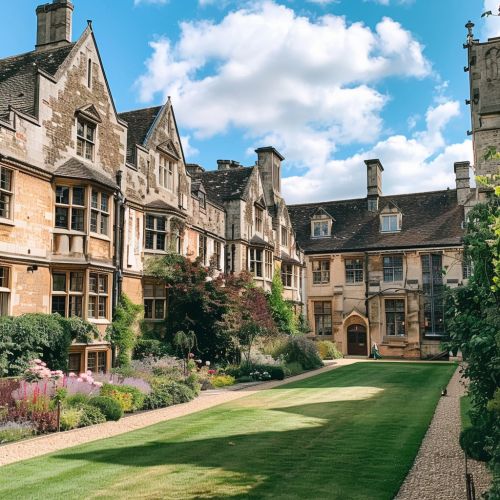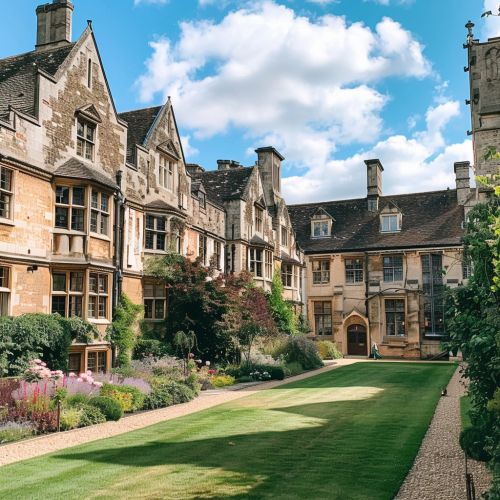Colleges of the University of Cambridge
Overview
The University of Cambridge, established in 1209, is a collegiate university located in Cambridge, England. It comprises 31 autonomous colleges, each with its own distinct history, traditions, and governance. These colleges are integral to the university's structure, providing accommodation, social spaces, and pastoral care for students and faculty. They also play a significant role in the academic life of the university, organizing small group teaching sessions known as supervisions.
Historical Development
The collegiate system of the University of Cambridge evolved over several centuries. The earliest colleges were established in the 13th and 14th centuries, with Peterhouse being the first, founded in 1284 by Hugo de Balsham, the Bishop of Ely. The establishment of colleges was often driven by the need to provide housing and support for scholars who were otherwise living in hostels or lodgings.
During the medieval period, colleges were primarily religious institutions, with many founded by bishops, monarchs, or wealthy patrons. The Reformation in the 16th century brought significant changes, including the dissolution of monastic colleges and the establishment of new ones with a more secular focus. The 19th and 20th centuries saw further expansion and modernization, with the founding of colleges specifically for women and the integration of women into previously all-male colleges.
Structure and Governance
Each college at Cambridge is an independent institution with its own endowment and property. They are self-governing, with a governing body typically consisting of the Master and Fellows. The Master is the head of the college, while the Fellows are senior members who contribute to the academic and administrative functions.
Colleges are responsible for admitting undergraduate students, providing accommodation, and offering pastoral care. They also organize supervisions, which are small group teaching sessions that complement university lectures and seminars. Each college has its own set of statutes and regulations, which govern its operations and the conduct of its members.
List of Colleges
The University of Cambridge consists of 31 colleges, each with its own unique character and history. Below is a comprehensive list of these colleges, along with notable details about each:
Peterhouse
Founded in 1284, Peterhouse is the oldest college at Cambridge. It has a strong tradition in the sciences and humanities and is known for its beautiful architecture and historic library.
Clare College
Established in 1326, Clare College is the second oldest college. It is renowned for its picturesque gardens and the Clare Bridge, the oldest bridge in Cambridge still in use.
Pembroke College
Founded in 1347 by Marie de St Pol, Pembroke College has a long history of academic excellence. It is known for its chapel, designed by Sir Christopher Wren.
Gonville and Caius College
Originally founded in 1348 and refounded in 1557, Gonville and Caius College has a strong emphasis on medical sciences. It boasts several Nobel laureates among its alumni.
Trinity Hall
Established in 1350, Trinity Hall is one of the smaller colleges. It has a strong focus on law and the humanities.
Corpus Christi College
Founded in 1352 by the Guilds of Corpus Christi and the Blessed Virgin Mary, Corpus Christi College is known for its historic Parker Library, which houses a significant collection of medieval manuscripts.
King's College
Founded in 1441 by King Henry VI, King's College is famous for its chapel and the annual Christmas Eve service, "A Festival of Nine Lessons and Carols."
Queens' College
Established in 1448 by Margaret of Anjou and refounded in 1465 by Elizabeth Woodville, Queens' College is known for its iconic Mathematical Bridge and historic buildings.
St Catharine's College
Founded in 1473, St Catharine's College has a strong tradition in the arts and humanities. It is known for its friendly and inclusive community.
Jesus College
Established in 1496 on the site of the twelfth-century Benedictine nunnery of St Mary and St Radegund, Jesus College is known for its beautiful chapel and strong academic performance.
Christ's College
Founded in 1505 by Lady Margaret Beaufort, Christ's College has a distinguished history of academic excellence. It is the alma mater of Charles Darwin.
St John's College
Established in 1511 by Lady Margaret Beaufort, St John's College is one of the largest and wealthiest colleges. It is known for its stunning architecture and extensive gardens.
Magdalene College
Founded in 1428 as a Benedictine hostel and refounded in 1542, Magdalene College is known for its historic Pepys Library, which houses the collection of Samuel Pepys.
Trinity College
Established in 1546 by King Henry VIII, Trinity College is the largest and wealthiest college at Cambridge. It has a long tradition of academic excellence and is known for its impressive Great Court.
Emmanuel College
Founded in 1584 by Sir Walter Mildmay, Emmanuel College has a strong tradition in the sciences and humanities. It is known for its beautiful gardens and historic chapel.
Sidney Sussex College
Established in 1596 by Lady Frances Sidney, Sidney Sussex College is known for its friendly and inclusive community. It has a strong tradition in the arts and sciences.
Downing College
Founded in 1800 by the will of Sir George Downing, Downing College has a strong emphasis on law and medicine. It is known for its neoclassical architecture and spacious grounds.
Girton College
Established in 1869, Girton College was the first residential college for women in the UK. It became coeducational in 1979 and is known for its strong tradition in the arts and sciences.
Newnham College
Founded in 1871, Newnham College is one of the few remaining all-women colleges at Cambridge. It has a strong tradition in the humanities and social sciences.
Selwyn College
Established in 1882 in memory of Bishop George Augustus Selwyn, Selwyn College has a strong tradition in the arts and humanities. It is known for its friendly and inclusive community.
Fitzwilliam College
Founded in 1869 as a non-collegiate institution and granted collegiate status in 1966, Fitzwilliam College has a strong tradition in the sciences and humanities. It is known for its modern architecture and inclusive community.
Murray Edwards College
Established in 1954 as New Hall and renamed in 2008, Murray Edwards College is one of the few remaining all-women colleges at Cambridge. It has a strong tradition in the arts and sciences.
Churchill College
Founded in 1958 in memory of Sir Winston Churchill, Churchill College has a strong emphasis on science and technology. It is known for its modern architecture and extensive grounds.
Darwin College
Established in 1964, Darwin College was the first graduate-only college at Cambridge. It has a strong tradition in the sciences and humanities.
Wolfson College
Founded in 1965 as University College and renamed in 1973, Wolfson College is a graduate-only college with a strong emphasis on interdisciplinary research.
Clare Hall
Established in 1966, Clare Hall is a graduate-only college with a strong tradition in the sciences and humanities. It is known for its inclusive and international community.
Robinson College
Founded in 1977 by the benefaction of Sir David Robinson, Robinson College has a strong tradition in the arts and humanities. It is known for its modern architecture and inclusive community.
Lucy Cavendish College
Established in 1965 and named after Lucy Cavendish, a pioneer of women's education, Lucy Cavendish College became coeducational in 2021. It has a strong tradition in the arts and sciences.
Hughes Hall
Founded in 1885 as a training college for women teachers and granted collegiate status in 1949, Hughes Hall is one of the oldest graduate colleges at Cambridge. It has a strong tradition in the sciences and humanities.
St Edmund's College
Established in 1896 as a Catholic institution and granted collegiate status in 1998, St Edmund's College has a strong tradition in the humanities and social sciences.
Homerton College
Founded in 1768 as a dissenting academy and granted collegiate status in 2010, Homerton College has a strong tradition in the arts and humanities. It is known for its modern architecture and inclusive community.


Academic and Social Life
The colleges of the University of Cambridge play a crucial role in the academic and social life of their members. Each college provides a supportive environment where students can live, study, and socialize. The colleges organize various academic and extracurricular activities, including lectures, seminars, sports, and cultural events.
Supervisions are a distinctive feature of the Cambridge educational system. These are small group teaching sessions, typically involving one or two students and a supervisor, who is an expert in the subject. Supervisions provide personalized and intensive academic support, allowing students to explore their subjects in depth and develop critical thinking skills.
Colleges also offer various facilities, including libraries, computer rooms, dining halls, and common rooms. Many colleges have their own sports teams and societies, providing opportunities for students to engage in a wide range of activities and develop new interests.
Admissions and Scholarships
Each college at Cambridge is responsible for admitting its own students. The admissions process is highly competitive, with applicants required to demonstrate academic excellence and potential. The process typically involves submitting an application through UCAS, followed by written assessments and interviews.
Colleges offer various scholarships and bursaries to support students financially. These awards are based on academic merit, financial need, or specific criteria set by the college. Scholarships and bursaries help ensure that talented students from all backgrounds can access a Cambridge education.
Traditions and Ceremonies
The colleges of the University of Cambridge have a rich heritage of traditions and ceremonies. These include formal dinners, known as "Formal Halls," where students and faculty dine together in academic dress. Formal Halls are an opportunity to experience the college's traditions and socialize with fellow members.
Another significant tradition is the May Ball, an annual event held in June to celebrate the end of the academic year. May Balls are lavish events featuring music, entertainment, and fine dining, and are a highlight of the social calendar.
Colleges also participate in various university-wide ceremonies, such as matriculation, where new students are formally admitted to the university, and graduation, where degrees are conferred. These ceremonies are steeped in history and tradition, reflecting the university's long-standing heritage.
Notable Alumni
The colleges of the University of Cambridge have produced numerous notable alumni who have made significant contributions to various fields. Some of the most distinguished alumni include:
- Sir Isaac Newton (Trinity College) - Renowned physicist and mathematician.
- Charles Darwin (Christ's College) - Naturalist and author of "On the Origin of Species."
- John Maynard Keynes (King's College) - Influential economist.
- Sylvia Plath (Newnham College) - Acclaimed poet and novelist.
- Stephen Hawking (Gonville and Caius College) - Theoretical physicist and cosmologist.
These alumni exemplify the academic excellence and intellectual legacy of the University of Cambridge.
